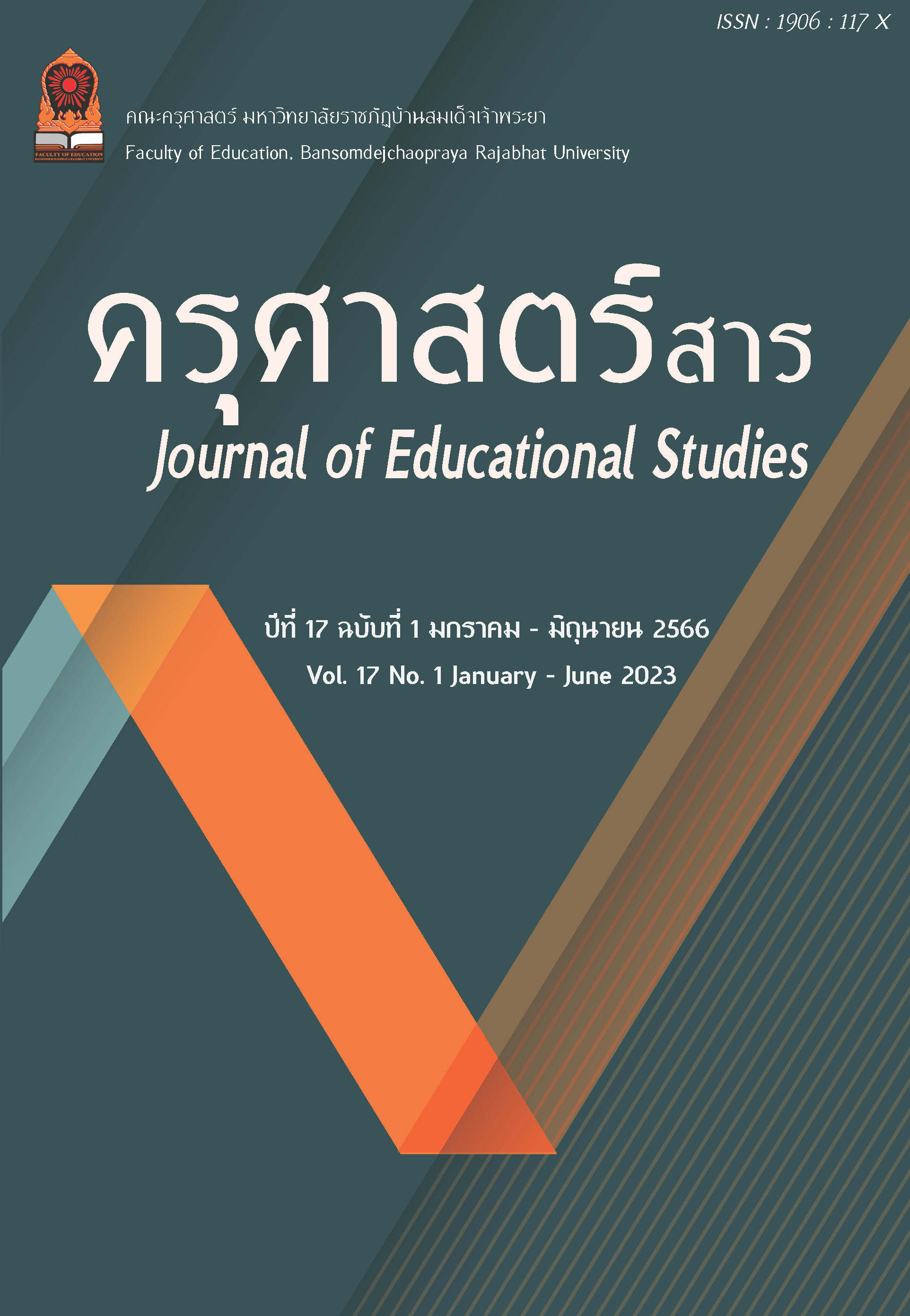The results of using the Inquiry process skill set to develop critical thinking Abilities of 2th year students majoring in Public Administration at Bansomdejchaopraya Rajabhat University
Keywords:
Inquiry process skill set, critical thinking abilitiesAbstract
The results of using the Inquiry process skill set to develop critical thinking abilities of 2th year students majoring in Public Administration at Bansomdejchaopraya Rajabhat University The objective was to develop a set of exercises on the Inquiry process skill set. according to the 80/80 performance criteria and to compare the ability to think There is judgment between before studying and after studying. The sample group was 2nd year students in the Department of Public Administration. Bansomdejchaopraya Rajabhat University Studying in the second semester of the academic year 2022, enrolled in the public policy and planning course, 1 class, 35 students, obtained by selective sampling. The research tools were 1) a set of exercises for Inquiry process skill set, 2) a learning management plan, and 3) a critical thinking ability test. The style is a multiple-choice type. The statistics used in the research were: 1) Efficiency determination of the 80/80 skill set, calculated from the E1/E2 formula; 2) Pre-learn and post-learn analysis. with average standard deviation and non-independent t-test.
The results showed that
1) Efficiency of the Inquiry process skill set Efficiency was 87.42/80.00 percent, higher than the specified criteria of 80/80.
2) have the ability to think critically after school is higher than before with the Inquiry process skill set training set at statistical significance at the .01 level
Downloads
References
กัลยาณี ศรีสุขพันธ์. (2562). การพัฒนาการคิดอย่างมีวิจารณญาณของนักเรียนชั้นมัธยมศึกษาปี ที่ 5 โดยการจัด การเรียนรู้แบบสืบเสาะทางวิทยาศาสตร์ร่วมกับการเรียนรู้แบบร่วมมือ เรื่อง กรด-เบส. วิทยานิพนธ์ (ศศ.ม. (การสอนวิทยาศาสตร์)). มหาวิทยาลัยรังสิต.
ชำนาญ ปาณาวงษ์. (2563). ระเบียบวิธีวิจัยเชิงคุณภาพ : จากแนวคิดทฤษฎีสู่การปฏิบัติ. พิษณุโลก : สำนักพิมพ์มหาวิทยาลัยนเรศวร.
ปิยาณี ณ นคร. (2558) การพัฒนารูปแบบการเรียนการสอนการสะทอนคิดอย่างมีวิจารณญาณเพื่อพัฒนาการคิดอยางมีวิจารณญาณของนักศึกษาพยาบาล. ปริญญานิพนธ์ (ปร.ด.(การวิจัยและพัฒนาหลักสูตร)) : มหาวิทยาลัยศรีนครินทรวิโรฒ.
ยะยา ยุทธิปูน, & มารุต พัฒผล. (2563). การพัฒนารูปแบบการจัดการเรียนรู้ที่เสริมสร้างความเชื่อมั่นในการสื่อสารภาษาอังกฤษและทักษะชีวิต สำหรับผู้เรียนระดับมัธยมศึกษาตอนต้น.ปริญญานิพนธ์ (ปร.ด.(การวิจัยและพัฒนาหลักสูตร)) : มหาวิทยาลัยศรีนครินทรวิโรฒ.
วัชรพล จันทรวงศ์. (2562). ความสามารถและกระบวนการคิดอย่างมีวิจารณญาณในเนื้อหาฟิสิกส์ เรื่อง การเคลื่อนที่แนวตรง ของนักเรียนชั้นมัธยมศึกษาปีที่ 4. วารสารวิชาการและวิจัยสังคมศาสตร์. Vol. 14 No. 3 (2019): กันยายน-ธันวาคม 2562.
วิระวรรณ สุภานันท์. (2564). การพัฒนาแบบฝึกทักษะการอ่านคิดอย่างมีวิจารณญาณ กลุ่มสาระ การเรียนรู้ภาษาไทย สำหรับนักศึกษาชั้นปีที่ 1 คุรุสภาวิทยาจารย์. ฉบับที่่ 3 กันยายน – ธันวาคม 2564
สำนักงานสภานโยบายการอุดมศึกษา. (2562). พระราชบัญญัติการอุดมศึกษา พ.ศ. 2562 . กองกฎหมายการศึกษาและวัฒนธรรม สำนักงานคณะกรรมการกฤษฎีกา
สำนักงานสภานโยบายการอุดมศึกษา. (2562). พระราชบัญญัติสภานโยบายการอุดมศึกษา วิทยาศาสตร์ วิจัยและนวัตกรรมแห่งชาติพ.ศ. ๒๕๖๒. เล่ม ๑๓๖ ตอนที่ ๕๗ ก.
สุรพล นิติไกรพจน์.(2557). กฎหมายหลักเกี่ยวกับอุดมศึกษา. กรุงเทพฯ : สำนักพิมพ์สถาบันคลังสมอง.
Bassham, G., Irwin, W., Nardone, H., & Wallace, J. M. (2013). Critical thinking: A student's introduction (5th ed.). New York, NY: McGraw-Hill.
Facione, P. A. (2013). Critical thinking: What it is and why it counts. Millbrae, CA: Measured Reason and the California Academic Press.
Downloads
Published
How to Cite
Issue
Section
License

This work is licensed under a Creative Commons Attribution-NonCommercial-NoDerivatives 4.0 International License.
บทความที่ได้รับการตีพิมพ์เป็นลิขสิทธิ์ของคณะครุศาสตร์ มหาวิทยาลัยราชภัฏบ้านสมเด็จเจ้าพระยา
ข้อความที่ปรากฏในบทความแต่ละเรื่องในวารสารวิชาการเล่มนี้เป็นความคิดเห็นส่วนตัวของผู้เขียนแต่ละท่านไม่เกี่ยวข้องกับมหาวิทยาลัยราชภัฏบ้านสมเด็จเจ้าพระยา และคณาจารย์ท่านอื่นๆในมหาวิทยาลัยฯ แต่อย่างใด ความรับผิดชอบองค์ประกอบทั้งหมดของบทความแต่ละเรื่องเป็นของผู้เขียนแต่ละท่าน หากมีความผิดพลาดใดๆ ผู้เขียนแต่ละท่านจะรับผิดชอบบทความของตนเอง



